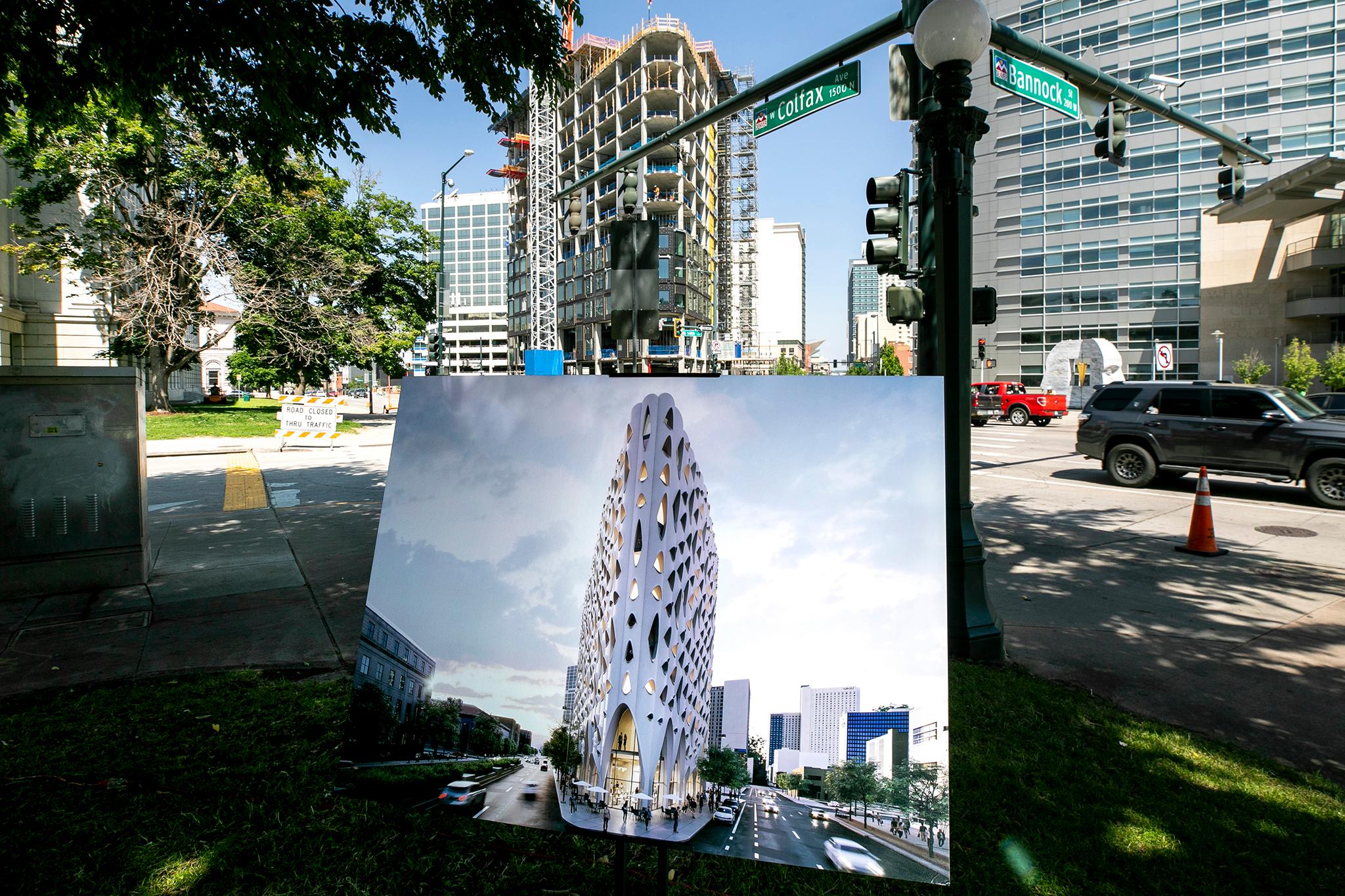The real estate industry isn't exactly known for confronting the climate crisis in its construction methods.
But Jon Buerge, the president of Urban Villages, hopes Downtown Denver's new Populus Hotel will set a new green friendly standard and inspire other developers to follow suit.
The company, which has worked on Union Station and Larimer Square, has committed itself to building projects that connect people to the natural environment. In this case, the Populus is responding to Civic Center, the century-old park sandwiched between the Statehouse and the City and County Building.
The Populus, designed by Studio Gang, is the Aspen tree-inspired structure rising at 14th and Colfax Avenues, caddy corner to Civic Center Park. The plot of land is the site of Colorado's first gas station, and will be the first hotel downtown to not include parking, according to the developers.
The hotel is slated to open in the spring of 2024, and on Wednesday, the final beam was added to the roof.
The developers plan for the hotel to be a high-end destination for both tourists and locals.
The new building is 13 stories high and will boast 265 rooms, a rooftop restaurant and bar, and street-level retail and restaurants open to the community.
The plan is to use the building to connect Downtown Denver to Civic Center Park and the Golden Triangle, a growing neighborhood offering some of the densest housing in the metro area.
Mario Tricoci, founder and CEO of Chicago's Aparium Hotel Group, said the building is designed to be a "social hub," where visitors and tourists alike can "experience something that is truly authentic, something that is truly Denver, Colorado, something that is Downtown."

The hotelier, who runs 11 hotels nationwide, including the Clayton Hotel and Members Club in Cherry Creek, plans to connect with local artists, farmers, brewers, ironworkers, millworkers and more in the construction and operation of the business.
The hotel staff will include no fewer than 150 employees, and the plan is to hire as many Denver-based workers as possible.
Eventually, the Populus will host philanthropic events, collaborate with the Civic Center Conservancy -- the nonprofit that manages the park, and showcase local musicians and artists. The idea is to connect with Denverites in any way possible -- and profitable -- and to do so with an eco-conscious ethic.
"We're a profit-driven business," Buerge said. "And we have no shame in that. And our projects are financially viable. And in fact, in many circumstances, we're exceeding market rate returns."
So how do the developers plan to make the building eco-friendly?
Buerge said he is proud that the hotel will be the country's first to sequester more carbon than it emits.
He's quick to point out the environmental toll of new developments and the real estate industry: a sizable portion of greenhouse gas emissions come from real estate and a massive amount of landfill waste comes from demolition and construction.
Building projects designed to last is one way to lessen the environmental impact of new projects.
"The best thing we can do is build a building that can last hundreds of years," said Grant McCargo, the CEO of Urban Villages.
But that's not all.

The developer is calculating the carbon footprint of each material used in construction. Urban Villages, which isn't just the developer but also plans to be the long-term owner of the hotel, also promises to calculate the carbon footprint of everything involved in daily operations.
The hotel, funded entirely through private dollars, has "a very real commitment, in perpetuity, to offset that carbon footprint through planting trees through sustainable agriculture and other practices," Buerge said.
Research from the Frontiers in Forests and Global Change suggests that the value of carbon offset projects through tree planting has been overstated in recent years and more needs to be done to account for the actual value of such projects. But sometimes such projects are effective.
"Reforestation projects can be really good carbon climate mitigation projects and the carbon accounting can be accurate," said Barbara Haya, the director of the Berkeley Carbon Trading Project with the Goldman School of Public Policy at the University of California Berkeley.
To offset the carbon emissions from development, Urban Villages plans to plant more than 72,000 Engelmann spruce trees in Gunnison County, to refurbish a forest devastated by pine beetles.

"Over the next five to seven years, that forest will sequester more carbon than we have emitted in building this building," Buerge said.
By making the hotel parking-free, the hope is that customers -- visitors and locals alike -- use other forms of transportation, such as public transit, bikes, scooters, wheelchairs and feet, to get around town.
Buerge hopes these strategies inspire other developers to play a larger role in addressing the climate crisis through similar strategies.
"We cannot effectively address the earth emergency we're facing today," Buerge added, "unless the real estate industry plays a key role."
Correction: An earlier version of this story misstated the address of the Populus. We regret the error.











